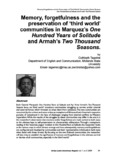Please use this identifier to cite or link to this item:
https://cris.library.msu.ac.zw//handle/11408/1327| Title: | Memory, forgetfulness and the preservation of ‘third world’ communities in Marquez’s One Hundred Years of Solitude and Armah’s Two Thousand Seasons | Authors: | Tagwirei, Cuthbeth | Keywords: | Third world | Issue Date: | 2009 | Publisher: | Unisa Publications | Series/Report no.: | Unisa Latin American Report;Vol. 1, No. 2; p.39-50 | Abstract: | Both Gabriel Marquez’s One Hundred Years of Solitude and Ayi Kwei Armah’s Two Thousand Seasons focus on ‘third world’ transitory communities struggling to survive amidst internal and external forces which threaten to erase them from existence. The two communities are conceived, by the writers and some critics, as metaphors of Africa and Latin America’s respective pursuits of nationhood in the face of challenges ranging from internal conflicts to Western imperialism. While the results of the struggles by these communities may differ in the end, it is the researcher’s observation that memory and/or forgetfulness are made central to both cases as the ultimate keys to self-preservation or characteristic obliteration. Through a metaphoric reading of the ‘insomnia plague’ incident in One Hundred Years of Solitude, the researcher looks at the various ways in which threats emerge and how, subsequently, memory and forgetfulness are configured and ritualised by communities and their representative individuals in both texts when faced with these threats. By focusing on the two fictional communities, the researcher will also tries to establish the significance of memory and forgetfulness in the ultimate survival or demise of all communities, especially in the ‘third world. | URI: | http://hdl.handle.net/11408/1327 |
| Appears in Collections: | Research Papers |
Files in This Item:
| File | Description | Size | Format | |
|---|---|---|---|---|
| Cuthbeth Tagwirei- Memory and Forgetfulness in Armah and Marquez.pdf | Abstract | 301.39 kB | Adobe PDF |  View/Open |
Page view(s)
152
checked on Feb 10, 2026
Download(s)
108
checked on Feb 10, 2026
Google ScholarTM
Check
Items in MSUIR are protected by copyright, with all rights reserved, unless otherwise indicated.



